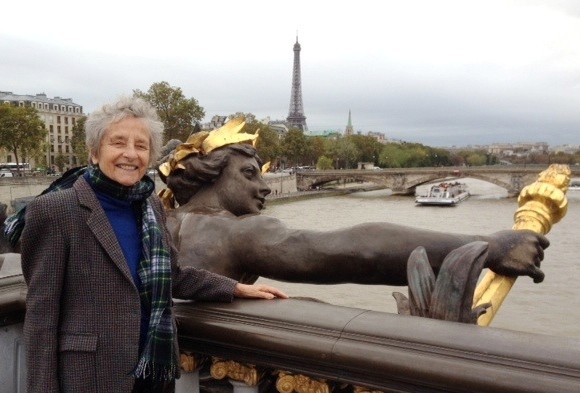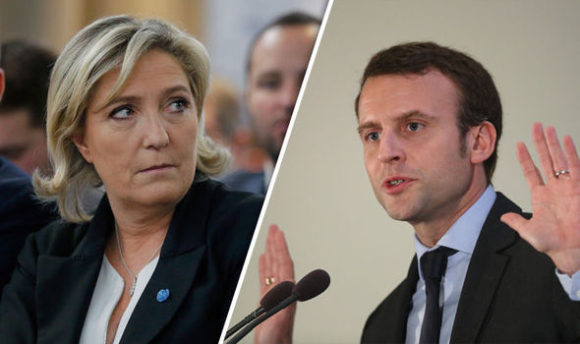
Out of a chaotic and divisive campaign to elect the president of France came a surprisingly middle-of-the-road and constructive vote. Emmanuel Macron, age 39, Europhile leader of the En Marche (EM) movement climbed to the first place with 24.01 percent of the votes. Marine Le Pen (Front National or FN), received 21.3 percent, both therefore qualifying for the run-off election on May 7. For the FN it was an historical feat after a long struggle, started in 1972, to be acknowledged as an honorable political party. The turn-out was high at 78 percent of the 47 million voters.
Until the last minute, the outcome was anyone’s guess. The four candidates – two extremists, one conservator, and one center right – were running in a close pack. “Fasten your seat belts” said a member of The City in London on the very morning of the elections, expressing the anxiety of the whole world. At stake were a rejection of the Euro and abandoning the European Union (EU.) “We were on the brink of world-wide financial tsunami” said one of the BFM radio economists. Many around the globe greeted the result with a sigh of relief.
For the French voters what was happening had a deeper meaning than the one described in the international press. This moment marks a painful turning point in French politics by ending the traditional pendulum swinging from Right to Left and wiping out the two main parties – the right wing Les Republicains (LR) and the Parti Socialiste (PS), which had been in existance for 30 years. The two winners were outsiders. This a wrenching process for the French, who love to criticize, but hate change.
The whole campaign was overshadowed by the “Penelope-gate” and Fillon’s other affaires (troubles) [*See Letter from Paris” published on March 5, 2017.] Bruno Retaillau, Fillon’s spokesman, commented with some bitterness, “This was not a campaign but a trial”.
On election night, as the numbers came up on the screens, political personalities made brief comments then left to be replaced by others. The right wing LR members announced they would transfer their votes to Emmanuel Macron. Jean Pierre Raffarin, prime minister from 2002 to 2005 under president Jacques Chirac, forcefully endorsed Macron. Jean François Copé, former president of the UMP (predecessor of LR) and minister, agreed that they had to block Marine Le Pen. He stressed that he would vote for En Marche but with a sinking heart. Alain Juppe, minister of Foreign Affairs under Nicolas Sarkozy and mayor of Bordeaux, also gave his vote to Macron saying “our country needs reforms.” François Fillon’s words were the best of his campaign, “The defeat of the LR is mine, I take all responsibility. ”
Jean Luc Malenchon, leader of the leftist movement la France Insoumise (rebellious France), was obviously very upset to have lost. Unlike the other candidates, he did not give instructions on how to vote in the run-off. Since seven millions supporters voted for him, this question of transfer of votes will greatly tip the scale.

On election night, Emmanuel Macron shared his satisfaction with the cheering flag-waving crowd in the huge hall at the Porte de Versailles. His first words were to thank the other candidates. Such courteousness is usually seen on the Rolland Garros tennis courts between Federer and Nadal, but certainly not among French politicians!
The electoral campaign took a sharp turn after April 23. All of a sudden, it became a confrontation between the two candidates, a ruthless fight to the finish. Macron was blasted for celebrating at the Rotonde brasserie on the first night and then for being invisible during the following two days. In contrast, Marine showed her ability as a superb strategist as she pre-empted the field immediately from the Ringis wholesale food market to a fishing trawler in the Mediterranean.
On April 26, Macron went to Amiens (90 miles north of Paris) , his home town, to meet with the Whirlpool plant workers due to be laid off in 2018. After talking with the Union representatives, he plunged into the battlefield and was roughed up by the angry crowd for 45 minutes.
But he stayed.
He talked to the workers, listened to their complaints. He even had a heated discussion with Jean François Raffin, who is a star in France and won a César (French version of Oscar) in 2017 for his documentary Merci Patron (Thank you, boss.) It is a satire on the relations between the working class and the super rich employers such as Bernard Arnaud, CEO of LVMH. Raffin, like Macron, is a native of Amiens.
Marine Le Pen, decided to drop by the Whirlpool site the same day. She appeared all smiles, selfie in hand, working the crowds, hugging and kissing, doing small talks. On an amazing picture she is shown beaming as she embraces a diminutive worker woman, who is in tears.
What happened in Amiens was emblematic of the confrontation between the two candidates in a difficult situation. The relocation of a profit-making factory to Poland, where salaries are five times lower than in France, is one of the core issues the European Union (EU) is facing.
Le Pen promised the world to the workers, such as keeping the factory in France and, if needed, having it nationalized. In contrast, the EM leader promised only to assist with the transition to other jobs. He had the courage to tell an overheated audience that there will be many more similar relocations and one has to adjust to the new economy.
“Çà n’est pas gagné” (we have not won yet) said Macron, getting into his car. He is right, especially when two people are fighting on different levels — one arousing fear and hatred, the other using pedagogy to propose obtainable solutions.
Editor’s Note: This is the opinion of Nicole Prévost Logan.

Nicole Prévost Logan
About the author: Nicole Prévost Logan divides her time between Essex and Paris, spending summers in the former and winters in the latter. She writes a regular column for us from her Paris home where her topics will include politics, economy, social unrest — mostly in France — but also in other European countries. She also covers a variety of art exhibits and the performing arts in Europe. Logan is the author of ‘Forever on the Road: A Franco-American Family’s Thirty Years in the Foreign Service,’ an autobiography of her life as the wife of an overseas diplomat, who lived in 10 foreign countries on three continents. Her experiences during her foreign service life included being in Lebanon when civil war erupted, excavating a medieval city in Moscow and spending a week under house arrest in Guinea.